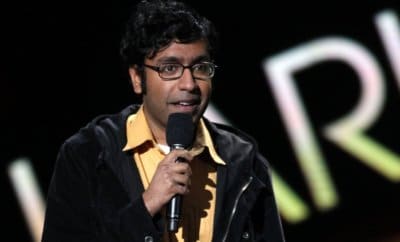Entertainment
Actor Hank Azaria ‘Willing To Step Aside’ From Voicing Apu on The Simpsons

Hank Azaria
Photo: YouTube Screenshot
Actor Hank Azaria says he wants to see inputs from an Indian or South Asian writer in the way Apu's character should be taken forward.
Following the backlash surrounding the character of Apu Nahasapeemapetilon on The Simpsons, actor Hank Azaria said he is willing to “step aside” from voicing the character.
He addressed the controversy surrounding the character, an Indian Kwik-E-Mart proprietor, during his appearance on The Late Show with Stephen Colbert on April 25. “The idea that anybody, young or old, past or present was bullied or teased based on the character of Apu, it just really makes me sad,” Azaria told Colbert. “It was certainly not my intention. I wanted to spread laughter and joy with this character, and the idea that it’s brought pain and suffering in any way, that it was used to marginalize people, it’s upsetting.”
The controversy surrounding the character first came to public discourse with Indian American comedian Hari Kondabolu’s documentary The problem with Apu which was released in November. The documentary, which featured fellow comedians and actors in the United States, such as Aziz Ansari, Kal Penn, Maulik Pancholy, Utkarsh Ambudkar, Samrat Chakrabarti, Sakina Jaffrey, Aasif Mandvi, Hasan Minhaj and Simpsons writer Dana Gould, among others, talked about the character and how its legacy impacted their lives as part of the diaspora living in America. Kondabolu maintained that he would be open to a conversation with Azaria about Apu.
Kondabolu said in November, following the release of his documentary: “I would absolutely talk to him. Ultimately the film is about accountability, it’s about respect, it’s about open dialogue.”
On Colbert’s show, Azaria, a Jewish American actor who traces his roots to Greece, clarified that he is not involved in the show’s response to the feedback and would be willing to transition out of the role. “I think the most important thing is to listen to Indian people and their experience with it. Listening to voices means inclusion in the writers’ room. I really want to see Indian, South Asian writer, writers in the room. Not in a token way, but genuinely informing whatever new direction this character may take, including how it is voiced or not voiced,” he said.
“I’m perfectly willing to step aside. It just feels like the right thing to do to me,” he added.
Responding to the interview, Kondabolu wrote on Twitter: “Thank you, @HankAzaria. I appreciate what you said & how you said it.”
Thank you, @HankAzaria. I appreciate what you said & how you said it. https://t.co/Otmxygf3DP
— Hari Kondabolu (@harikondabolu) April 25, 2018
Earlier this month, an episode on The Simpsons raked up the conversation surrounding the documentary, receiving much backlash. The episode, aired on April 8, featured Marge Simpson sharing her favorite childhood book with daughter Lisa before realizing that it had racist stereotypes about people of Irish and Latin American descent. Her attempts to edit the story cause Lisa, billed as the most progressive character on the show, to remark: “Something that started decades ago and was applauded and inoffensive is now politically incorrect. What can you do?”
With this line, Lisa looks at the picture of Apu on her nightstand. The photo carries the text: “Don’t have a cow.”
Kondabolu responded to the episode with a tweet the next day, saying, “In The Problem with Apu, I used Apu & The Simpsons as an entry point into a larger conversation about the representation of marginalized groups & why this is important. The Simpsons response tonight is not a jab at me, but at what many of us consider progress.”
A week later, The Simpsons showrunner and executive producer, Al Jean, responded to the feedback the episode received on Twitter. He said: “I truly appreciate all the responses pro and con. Will continue to try and find an answer that is popular & more important right.”
.@TheSimpsons I truly appreciate all responses pro and con. Will continue to try to find an answer that is popular & more important right
— Al Jean (@AlJean) April 13, 2018



